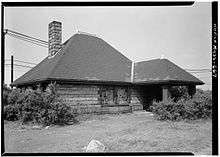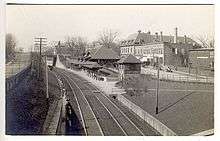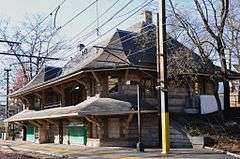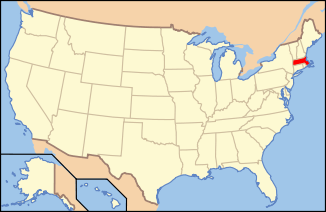Newton Railroad Stations Historic District
|
Woodland, Newton Highlands, and Newton Centre Railroad Stations, and Baggage and Express Building | |
|
Newton Highlands station in 2011 | |
| Location | Newton, Massachusetts |
|---|---|
| Built | 1886-1891 |
| Architect | Henry Hobson Richardson; Shepley, Rutan & Coolidge |
| Architectural style | Richardsonian Romanesque |
| NRHP Reference # | 76002137[1] |
| Added to NRHP | March 25, 1976 |
The Newton Railroad Stations Historic District in Newton, Massachusetts is composed of three geographically separate historic railroad stations and one baggage/express building on the former Boston and Albany Railroad Highland Branch, which was converted to MBTA Green Line "D" Branch in 1959.
The four buildings in Newton plus Allston are the only extant stations of thirteen designed by H.H. Richardson and his successors Shepley, Rutan, and Coolidge in Allston/Brighton, Newton, and Brookline for the B&A's Newton Circuit between 1881 and 1894.[2] Most originally had their grounds designed by landscape architect Frederick Law Olmsted, but none of the landscaping has survived.[3]
On March 25, 1976, the district was added to the National Register of Historic Places as the Woodland, Newton Highlands, and Newton Centre Railroad Stations, and Baggage and Express Building.
Components
The component buildings in the district are:
Woodland Railroad Station

The B&A commissioned buildings from H.H. Richardson for three new stops at Boylston Street, Beacon Street, and Washington Street (later called 'Woodland) in October 1884. The three stations were built in largely unoccupied areas of Newton, and the attractive architecture was intended to bring in new residents who would become paying customers of the railroad.[2] By this time, Richardson was in failing health; his successors Shepley, Rutan and Coolidge may have done most of the design work. Construction by the Norcross Brothers firm began in June 1886 - two months after Richardson's death - and finished that September.[2] Similar to the other stations on the line, it was built in the heavy stone Richardsonian Romanesque style with a dominant roofline. The corners facing the tracks were cut back to serve as porches.[2]
When the line was converted for trolley service in 1959, the new Woodland station was built somewhat to the east of the original station, as the latter was surrounded by a golf course with no room for a parking lot. Because of this, the station building was not torn down like most on the line were, although it has fallen into disrepair. It sits on the grounds of the Woodland Golf Club, which uses it as a storage space.[3]
Newton Highlands Railroad Station
The Newton Highlands Railroad Station is located at 18 Station Avenue in the village of Newton Highlands. Although its interior is no longer in use, its exterior still provides some shelter for passengers of the Newton Highlands MBTA station.
Newton Centre Railroad Station

The Newton Centre Railroad Station is located at 70 Union Street in the village of Newton Centre.[4] Designed by Richardson in 1886, it was finished by his successor firm of Shepley, Rutan and Coolidge. The interior of the building used to house a Starbucks coffee shop containing a sign that indicated when a Boston-bound train arrived. However, the coffeehouse was closed in the fall of 2008 as part of Starbucks' restructuring campaign due to the economic recession.[5] The station now houses the Deluxe Station Diner, a satellite restaurant of the Deluxe Town Diner in Coolidge Square, Watertown, Massachusetts.[6] The exterior is part of the Newton Center MBTA station; the building is a contributing element of the Union Street Historic District.[4]
Baggage and Express Building
The Baggage and Express Building was located at 50 Union Street In Newton Centre adjacent to the Newton Centre Railroad Station. It was divided into separate spaces for baggage and Railway Express Agency. It was mostly demolished in 1985. Part of original the building was incorporated into the new construction on the site.[4]
See also
References
- ↑ National Park Service (9 July 2010). "National Register Information System". National Register of Historic Places. National Park Service. Retrieved 4 February 2016.
- 1 2 3 4 Ochsner, Jeffrey Karl (June 1988). "Architecture for the Boston & Albany Railroad: 1881-1894". Journal of the Society of Architectural Historians. 47 (2). doi:10.2307/990324. JSTOR 990324. (subscription required (help)).
- 1 2 Roy, John H. Jr. (2007). A Field Guide to Southern New England Railroad Depots and Freight Houses. Branch Line Press. p. 261,274. ISBN 9780942147087.
- 1 2 3 "NRHP nomination for Union Street Historic District". Commonwealth of Massachusetts. Retrieved 2014-04-22.
- ↑ Full List of U.S. Store Closures
- ↑ http://www.boston.com/yourtown/news/newton/2010/05/deluxe_diner_in_newton_centre.html
External links
![]() Media related to Newton Railroad Stations Historic District at Wikimedia Commons
Media related to Newton Railroad Stations Historic District at Wikimedia Commons

